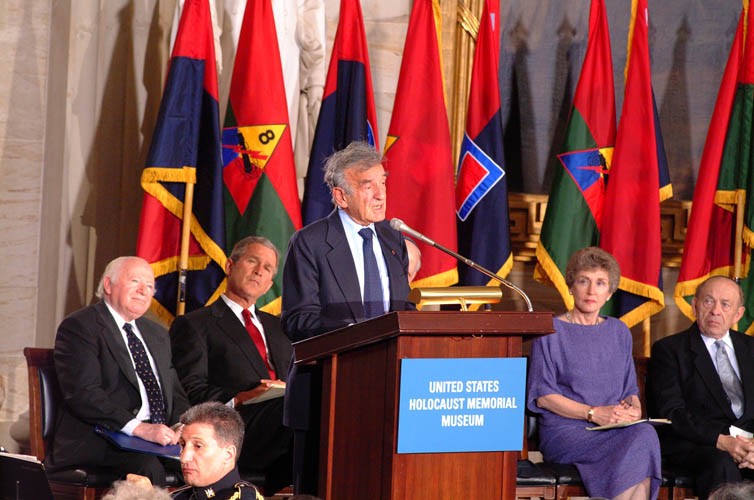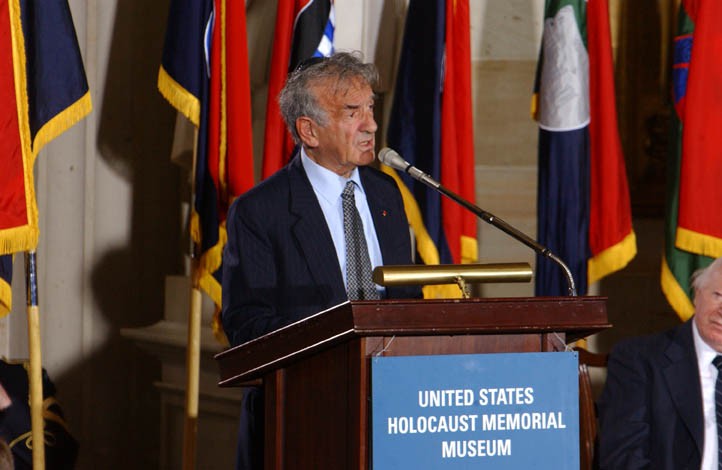Elie Wiesel: Days of Remembrance excerpts
Read excerpts below from Elie Wiesel's Days of Remembrance addresses.

2001
How does one mourn for six million people who died? How many candles does one light? How many prayers does one recite? Do we know how to remember the victims, their solitude, their helplessness? They left us without a trace, and we are their trace.
We tell these stories because perhaps we know that not to listen, not to want to know, would lead you to indifference, and indifference is never an answer.
Whoever hates, hates everybody. Whoever kills, kills more than his victims.
We didn't even talk. Some of us tried. No one wanted to hear. But we did not become bitter. We believed naturally that one must bear witness. It wasn't easy. We knew, silence is forbidden, talk, impossible. But things are different today. Young people listen, they want to know. They visit our Museum, listen to survivors, and they want to learn how to prevent our past from becoming their future.
... this fiery memory remains and we, you and I, you and all of us, now are its very privileged custodians.

2002
We must remember, we must remember the times of cruelty and suffering when in the darkest of all places, in man's world, day after day, hour after hour, the killers killed, the victims perished.
We must remember the old men and women whispering ancient prayers, and the children, we must always remember the children, frightened and forlorn, all part of a nocturnal procession walking towards the flames, rising to the highest heavens. Among those children there were future scientists, physicians, scholars, statesmen, writers, poets, philanthropists. One of them might have invented a cure for AIDS, or composed a text of such humanity that all the racists would be silenced to shame. In murdering them, the killers deprived the human family of its future. One and a half million Jewish children.
What was courage then? You hear me say occasionally that there must be light at the end of the tunnel. I believe that in those times there was light IN the tunnel. In a strange way there was courage IN the ghetto. And there was hope, human hope, IN the death camp. Simply an anonymous prisoner giving a piece of his bread to someone who was hungrier than he or she, a father shielding his child, a mother trying to hold back her tears so her children would not see her pain. That was courage.
But is there hope? Is there hope in memory? There must be. Without hope memory would be morbid and sterile. Without memory, hope would be empty of meaning, and above all, empty of gratitude.
2003
All the rivers run to the sea, days come and go, generations vanish, others are born, remembrance ceremonies follow one another—and hatred is still alive, and some of us, the remnant of the remnant, wonder with the poet Paul Celan: who will bear witness for the witness, who will remember what some of us tried to relate about a time of fear and darkness when so many, too many victims felt abandoned, forgotten, unworthy of compassion and solidarity? Who will answer questions whose answers the dead took with them? Who will feel qualified enough and strong enough, faithful enough to confront their fiery legacy? What was and remains clear to some of us, here and elsewhere, is the knowledge that if we forget them, we too shall be forgotten.
But is remembrance enough? What does one do with the memory of agony and suffering? Memory has its own language, its own texture, its own secret melody, its own archeology and its own limitations: it too can be wounded, stolen and shamed; but it is up to us to rescue it and save it from becoming cheap, banal, and sterile.
To remember means to lend an ethical dimension to all endeavors and aspirations.
2004
I remember: Late May 1944, the Russians were so near my town that, at night, we could hear their guns thunder. Germany needed every vehicle, every train, every military unit to stop the Red Army. But absolute priority was given the murder of Jews. Four transports left my town during the last part of May 1944, shortly before D-Day. When the train stopped at a small town named Auschwitz, we could never imagine that the name will enter history and move it to remorse and shame.
...let us remember those who suffered and perished then, those who fell with weapons in their hands and those who died with prayers on their lips, all those who have no tombs: our heart remains their cemetery.
Critical Thinking Questions
- Explore the many legacies of Elie Wiesel.
- Why is it important to remember the Holocaust?
- What does it mean to be a custodian of memory?

